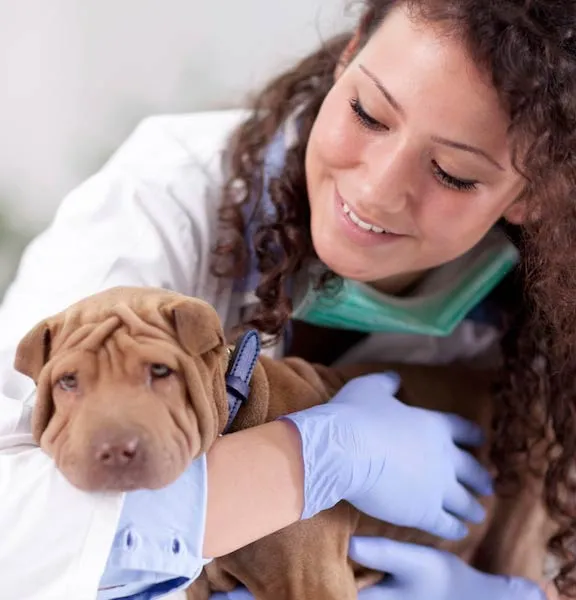As a loving dog owner, understanding the common health threats your furry friend might face is crucial for their well-being. Among the most prevalent internal parasites are roundworms and hookworms, which can significantly impact a dog’s health, particularly in puppies. These intestinal parasites are widespread, and recognizing the Symptoms Of Roundworms And Hookworms In Dogs early can lead to more effective treatment and prevention, ensuring your canine companion lives a happy, healthy life. Understanding how these parasites affect your dog, how they are transmitted, and what signs to look for is the first step in proactive pet care. For more on how these parasites can affect everyone in the family, you may want to learn if can roundworms pass from dog to human.
What Are Roundworms in Dogs?
Roundworms are incredibly common parasites, with almost all dogs encountering them at some point, most frequently during puppyhood. Two primary species affect dogs: Toxocara canis and Toxascaris leonina. Toxocara canis is particularly concerning as it can cause more severe illness and poses a zoonotic risk, meaning it can be transmitted to humans.
These spaghetti-like parasites, which can grow several inches long, reside in the dog’s intestinal tract, consuming partially digested food. This can lead to malnourishment, a serious issue, especially for small puppies whose immune systems are still developing and are less equipped to fight off adult worms compared to mature dogs.
How Dogs Contract Roundworms
Dogs can acquire roundworms through several common pathways:
- From their Mother: Puppies are frequently born with roundworms because the larvae can be transmitted from the mother just before birth or through her milk during nursing. If a female dog has previously been infected, dormant larvae can remain in her body tissues. These encysted larvae can reactivate during pregnancy, infecting her puppies either in utero or via lactation. Even healthy, well-cared-for mother dogs can pass these on, making routine deworming for puppies essential from a very young age. Owners of pregnant dogs should consult their vet about safe deworming treatments during pregnancy to minimize transmission risk.
- From the Environment: Dogs can become infected by accidentally ingesting roundworm eggs from contaminated soil, plants, or other objects in their environment.
- From Eating Infected Animals: Small animals like rodents, earthworms, birds, and certain insects can act as “transport hosts,” carrying roundworm eggs without developing adult worms themselves. If a dog eats one of these infected animals, the eggs can activate and mature into adult roundworms inside the dog.
 German Shepherd puppies playing outdoors
German Shepherd puppies playing outdoors
Puppies and dogs can pick up roundworm eggs from the soil while playing outdoors, especially if the area has been contaminated by the stools of infected dogs.
What Are Hookworms in Dogs?
Hookworms are another group of dangerous intestinal parasites that pose a significant health risk to dogs. Named for their distinctive hook-like mouthparts, these small worms (about 1/8 inch long) attach firmly to the lining of the small intestine. Unlike roundworms, which consume digested food, hookworms feed on the dog’s blood. This blood-sucking behavior can lead to considerable blood loss, especially in young puppies, and may result in severe anemia or inflammation of the intestine [cite:2, 3, 5, 1_4]. The most common species affecting dogs include Ancylostoma caninum and Uncinaria stenocephala [cite:5_4]. These parasites thrive in warm, moist environments, often found in areas with poor sanitation [cite:2, 3, 5_4].
How Dogs Contract Hookworms
Hookworms have several effective ways to infect dogs:
- Skin Penetration: Hookworm larvae, which hatch from eggs in contaminated soil, can actively burrow through a dog’s skin, most commonly through the paws, leading to infection [cite:1_1, 2_1, 3_1, 4_1, 5_1].
- Oral Ingestion: Dogs can accidentally ingest hookworm larvae by sniffing contaminated soil or feces, grooming their paws after walking on infected ground, or by drinking contaminated water [cite:1_1, 2_1, 3_1, 4_1, 5_1].
- From their Mother: Similar to roundworms, unborn puppies can contract hookworms via the placenta in utero, or through an infected mother’s milk during nursing [cite:2_1, 3_1, 4_1, 5_1]. This direct transmission is a major concern for puppies, as severe infections can be fatal.
- Eating Infected Animals: Though less common than other routes, dogs can also become infected by consuming other animals, such as cockroaches, that carry infective hookworm larvae in their tissues [cite:1_1].
Recognizing Roundworm Symptoms in Dogs
While some dogs might harbor roundworms without immediate symptoms, especially early in the infection, several signs can indicate their presence. Symptoms of a heavy roundworm infection often include:
- Malnourishment: Living in the intestines, roundworms compete with your dog for nutrients, leading to weakness, weight loss, and stunted growth, particularly noticeable in puppies.
- Pot-bellied Appearance: In untreated or severe cases, numerous adult roundworms can accumulate in the intestines, causing a distended, pot-bellied look in puppies.
- Coughing: Roundworm larvae sometimes migrate through the lungs, triggering coughing and other respiratory issues. In severe instances, this migration can even lead to pneumonia.
- Vomiting or Diarrhea: Digestive upsets are common, manifesting as vomiting and diarrhea, which can range from mild to severe.
- Visible Worms: Perhaps the most alarming symptom for owners is seeing the worms themselves. You might observe large, pale, spaghetti-like worms, sometimes still moving, in your dog’s vomit or stools. If you notice these, contact your veterinarian immediately for treatment. It’s important to distinguish these from small, rice-sized segments, which are more indicative of tapeworms, a different common parasite. If your dog exhibits concerning digestive issues, particularly can worms in dogs cause bloody diarrhea, it’s critical to seek veterinary advice promptly.
 Labrador puppies resting together
Labrador puppies resting together
Roundworms and hookworms can pose significant health concerns for puppies, often leading to severe symptoms due to their developing immune systems.
Key Symptoms of Hookworms in Dogs
Hookworm infections, especially in puppies, can be life-threatening due to the blood loss they cause. While adult dogs might show mild or no symptoms, severe signs can emerge quickly. Watch for these key symptoms:
- Anemia: This is a hallmark sign, resulting from the worms feeding on blood. Symptoms include pale gums, generalized weakness, and lethargy. Puppies are particularly susceptible to severe, even fatal, anemia.
- Dark, Tar-colored Diarrhea (Melena): Digested blood in the stool appears black and tarry, a strong indicator of gastrointestinal bleeding caused by hookworms.
- Weight Loss and Poor Condition: Despite adequate food intake, infected dogs may appear thin, have a dull or dry coat, and puppies may fail to grow or develop properly.
- Coughing: Similar to roundworms, hookworm larvae can migrate through the lungs, causing respiratory symptoms like coughing.
- Skin Irritations: If larvae penetrate the skin, particularly between the toes, they can cause dermatitis—irritated, red, and itchy patches. This is often referred to as “ground itch.”
- Vomiting: Some dogs with hookworms may also experience vomiting.
- Unlike roundworms, hookworms are rarely visible in stool due to their small size, making diagnosis reliant on professional veterinary examination.
Diagnosing Intestinal Worms
Diagnosing both roundworms and hookworms typically involves your veterinarian examining a fresh fecal sample under a microscope to look for eggs. This is a routine part of a puppy’s initial veterinary visits. However, if an infestation is light, eggs might not be present in the sample. Because roundworms are so common in puppies, and hookworms can be particularly dangerous, veterinarians often recommend assuming their presence in young puppies and initiating routine deworming treatments every few weeks. This proactive approach helps protect vulnerable puppies from severe illness before symptoms even appear.
The Risk to Humans: Roundworms and Hookworms
Both canine roundworms and hookworms can be transmitted to humans, though they generally do not complete their full life cycle in people. Despite this, they can still cause significant health problems.
- Roundworms (Visceral and Ocular Larva Migrans): If a person accidentally ingests canine roundworm eggs, for example, if a child plays in contaminated dirt and puts their hands in their mouth, the eggs can hatch into larvae. These larvae can then migrate and become encysted in various organs throughout the body, leading to conditions like visceral larva migrans (affecting internal organs) or ocular larva migrans (affecting the eyes), which can sometimes cause serious disease [cite:1_2, 2_2]. Preventing this involves prompt removal of dog stools from yards and public areas, keeping children from playing in contaminated soil, and frequent hand washing.
- Hookworms (Cutaneous Larva Migrans): Canine hookworm larvae can penetrate human skin, particularly when walking barefoot or sitting on soil or sand contaminated by animal feces. This causes a condition known as cutaneous larva migrans (CLM), characterized by itchy, red, winding tracks on the skin, often called “ground itch” [cite:1_2, 2_2, 3_2, 4_2]. While usually self-limiting, these lesions can be very uncomfortable. In rare cases, hookworm larvae can migrate to and damage internal organs, including the eyes, potentially causing blindness [cite:1_2, 3_2, 5_2]. One specific species, Ancylostoma braziliense, can even cause intestinal infection in humans [cite:4_2, 3_2]. Good hygiene, wearing shoes in potentially contaminated areas, and ensuring pets are dewormed are crucial preventative measures. For more information on preventing transmission, it is important to know if can you get roundworm from a dog.
 Child playing in grass with a dog
Child playing in grass with a dog
To reduce the risk of roundworm and hookworm transmission to humans, especially children, it is vital to pick up after dogs immediately in all outdoor areas.
Treatment and Prevention Strategies
Effectively treating and preventing roundworms and hookworms in your dog is key to their health and preventing human exposure.
- Veterinary Dewormers: Your veterinarian can provide safe and effective deworming medications designed to eliminate these parasites. It’s crucial to follow their instructions regarding dosage and treatment schedule.
- Monthly Preventatives: Many monthly heartworm medications also contain ingredients that prevent and control common intestinal worms, including roundworms and hookworms, on an ongoing basis [cite:2_1_4]. Discuss with your vet which preventative is best for your dog. For information on specific medications, you might explore over the counter heartworm medication for dogs.
- Environmental Hygiene: Regularly cleaning up dog feces immediately helps to prevent the spread of eggs and larvae in the environment, significantly reducing the risk of re-infection for your dog and transmission to humans. Good hygiene practices, such as washing hands frequently after handling pets or cleaning up waste, are also essential.
 Shar Pei puppy at the veterinarian for a check-up
Shar Pei puppy at the veterinarian for a check-up
Regular veterinary visits are essential for diagnosing and treating roundworms, hookworms, and other parasites, ensuring your dog receives the safest and most effective care.
Conclusion
Roundworms and hookworms are persistent threats to canine health, but with vigilance and proper care, they are manageable. Recognizing the subtle and overt symptoms of roundworms and hookworms in dogs is the cornerstone of early detection and intervention. From a pot-bellied appearance and coughing to severe anemia and dark, tarry stools, understanding these signs empowers you to act swiftly. Always consult your veterinarian for accurate diagnosis, treatment, and preventive strategies tailored to your dog’s specific needs. Proactive deworming, maintaining excellent hygiene, and routine veterinary check-ups are the best defenses against these common parasites, ensuring your beloved dog remains healthy and thriving.
